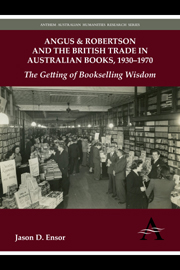 Angus & Robertson and the British Trade in Australian Books, 1930–1970
Angus & Robertson and the British Trade in Australian Books, 1930–1970 Published online by Cambridge University Press: 05 July 2013
[British publishers] have followed the precepts of guerrilla warfare: infiltrate the local scene; wrap yourself in righteous causes; do not neglect propaganda; organise tightly; retreat where necessary; [and] always avoid set-piece battles.
The above sentiment expressed by Robert Haupt in 1988 about the presence of British publishers in Australia and, by implication, overseas or imported texts in the local book trade, echoes other sentiments recorded decades earlier and equivalent complaints are heard today. Legally and commercially across the course of the twentieth century, British trading rights pertained to exclusive English-language rights throughout the former empire.2 Within this framework Australia was the largest export (or ‘run-on’)3 market for British books to 1959, valued at its peak to be worth £4,387,810 sterling in export turnover for British publishers;4 this value was a significant increase over Australia's estimated purchases of British books of £1.5 million sterling in 19485 and the second largest market for British books behind the United States after that time.6 During this period Australian booksellers, among whom the Australian firm Angus & Robertson doubled as publishers, were able to negotiate concessions from the peak organisation, the Publishers Association of Great Britain,7 prompting Hector MacQuarrie, managing director of Angus & Robertson's London office, to claim in 1949 that
The [Publishers Association] P.A. in the UK are all powerful and can dictate to [their] booksellers, inflicting sanctions when their orders are ignored or disobeyed.
To save this book to your Kindle, first ensure [email protected] is added to your Approved Personal Document E-mail List under your Personal Document Settings on the Manage Your Content and Devices page of your Amazon account. Then enter the ‘name’ part of your Kindle email address below. Find out more about saving to your Kindle.
Note you can select to save to either the @free.kindle.com or @kindle.com variations. ‘@free.kindle.com’ emails are free but can only be saved to your device when it is connected to wi-fi. ‘@kindle.com’ emails can be delivered even when you are not connected to wi-fi, but note that service fees apply.
Find out more about the Kindle Personal Document Service.
To save content items to your account, please confirm that you agree to abide by our usage policies. If this is the first time you use this feature, you will be asked to authorise Cambridge Core to connect with your account. Find out more about saving content to Dropbox.
To save content items to your account, please confirm that you agree to abide by our usage policies. If this is the first time you use this feature, you will be asked to authorise Cambridge Core to connect with your account. Find out more about saving content to Google Drive.